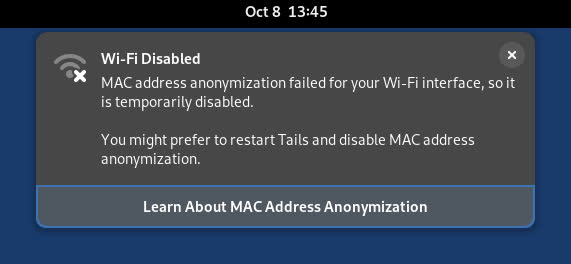Tails helps you to use the Internet anonymously and circumvent censorship almost anywhere you go and on any computer but leaving no trace unless you ask it to explicitly.
Tails is a complete OS designed to be used from a DVD, USB stick, or SD card independently of the computer's original operating system. Start on your Tails USB stick instead of starting on Windows, macOS, or Linux. Tails leaves no trace on the computer when shut down.
Tails helps you to:
- Use the Internet anonymously and circumvent censorship
- All connections to the Internet are forced to go through the Tor network
- Leave no trace on the computer you are using unless you ask it explicitly
- Use state-of-the-art cryptographic tools to encrypt your files, emails and instant messaging
Tails includes a selection of applications to work on sensitive documents and communicate securely. It comes with several built-in applications pre-configured with security in mind: web browser, instant messaging client, email client, office suite, image and sound editor, etc.
If you are interested in giving Tails a try on your current computer without running any risk, please check out our Guide: Running Linux From a USB Drive As a Virtual Machine or Bootable Disk.
What is Tails?
Tails is a portable Linux distribution based on Debian that combines the Tor network, the GNOME desktop and several other tools to offer a secure and anonymous computer experience.
How safe is Tails?
Tails is very safe as long as you do not run it on an infected machine. Tails is designed to run from a USB stick on any computer as a completely independent OS. However, if the host computer is infected with malware such as a keylogger your privacy would be at risk.
How does Tails ensure privacy?
Tails is set up out of the box to run from your computer's memory and never stores information locally unless you configure it to. This means that every time you shut down Tails, the memory is wiped clean, deleting all traces of your work and every new session starts as a blank slate.
Can I use Tails to circumvent censorship?
Yes, you can use Tails to circumvent internet censorship and browse the web anonymously. All the applications that come with Tails (email, browser, messaging client, office suite) use the Tor network to connect to the internet, so all your activity can be hidden.
Online anonymity and censorship circumvention with Tor
Tails relies on the Tor anonymity network to protect your privacy online:
- all software is configured to connect to the Internet through Tor
- if an application tries to connect to the Internet directly, the connection is automatically blocked for security.
Tor is free software and an open network that helps you defend against a form of network surveillance that threatens personal freedom and privacy, confidential business activities and relationships, and state security known as traffic analysis.
Tor protects you by bouncing your communications around a distributed network of relays run by volunteers all around the world: it prevents somebody watching your Internet connection from learning what sites you visit, and it prevents the sites you visit from learning your physical location.
Using Tor you can:
- be anonymous online by hiding your location
- connect to services that would be censored otherwise
- resist attacks that block the usage of Tor using circumvention tools such as bridges
What's New
Critical security fixes
The vulnerabilities described below were identified during an external security audit by Radically Open Security and disclosed responsibly to our team. We are not aware of these attacks being used against Tails users until now.
- These vulnerabilities can only be exploited by a powerful attacker who has already exploited another vulnerability to take control of an application in Tails.
- If you want to be extra careful and used Tails a lot since January 9 without upgrading, we recommend that you do a manual upgrade instead of an automatic upgrade.
- Prevent an attacker from installing malicious software permanently. (#20701)
In Tails 6.10 or earlier, an attacker who has already taken control of an application in Tails could then exploit a vulnerability in Tails Upgrader to install a malicious upgrade and permanently take control of your Tails.
- Doing a manual upgrade would erase such malicious software.
- Prevent an attacker from monitoring online activity. (#20709 and #20702)
In Tails 6.10 or earlier, an attacker who has already taken control of an application in Tails could then exploit vulnerabilities in other applications that might lead to deanonymization or the monitoring of browsing activity:
- In Onion Circuits, to get information about Tor circuits and close them.
- In Unsafe Browser, to connect to the Internet without going through Tor.
- In Tor Browser, to monitor your browsing activity.
- In Tor Connection, to reconfigure or block your connection to the Tor network.
- Prevent an attacker from changing the Persistent Storage settings. (#20710)
New features
- Detection of partitioning errors
- Sometimes, the partitions on a Tails USB stick get corrupted. This creates errors with the Persistent Storage or during upgrades. Partitions can get corrupted because of broken or counterfeit hardware, software errors, or physically removing the USB stick while Tails is running.
- Tails now warns about such partitioning errors earlier. For example, if partitioning errors are detected when there is no Persistent Storage, Tails recommends that you reinstall or use a new USB stick.
Changes and updates
- Update Tor Browser to 14.0.4.
- Update Thunderbird to 128.5.0esr.
- Remove support for hardware wallets in Electrum. Trezor wallets stopped working in Debian 12 (Bookworm), and so in Tails 6.0 or later.
- Disable GNOME Text Editor from reopening on the last file. (#20704)
- Add a link to the Tor Connection assistant from the menu of the Tor status icon on the desktop.
- Make it easier for our team to find useful information in WhisperBack reports.
For more details, read our changelog.
Tails 6.8.1 Release notes
New features
File system repair when unlocking the Persistent Storage
When the file system of the Persistent Storage has errors, Tails now offers you to repair the file system when unlocking from the Welcome Screen.
Because not all file system errors can be safely recovered this way, we wrote comprehensive documentation on how to recover data from the Persistent Storage using complementary techniques.
Changes and updates
- Update Tor Browser to 13.5.6.
- Improve the notification when a network interface is disabled because MAC address anonymization failed.
Fixed problems
- Increase the maximum waiting time to 8 minutes when unlocking the Persistent Storage before returning an error. (#20475)
- Hide shown password while unlocking Persistent Storage. (#20498)
- Better handle failures in when sending WhisperBack error messages:
- Fix input fields when Tails is not connected to Tor. (#19731)
- Fix accessibility of input fields with screen reader. (#19903)
For more details, read our changelog.











 English (US) ·
English (US) ·